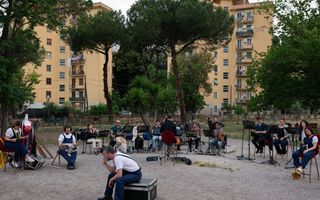(Finance) – In the game of “let’s pretend” so loved by preschool children, there would be nothing strange if those who went on stage, for once, were not professional actors and singers but workers, carpenters, make-up artists, set designers and costume designers who usually work behind the scenes. And they wouldn’t look out of place at all, because by hearing them sing and act, they too have learned those words and those songs.
So here it is Saturday 28th Septemberin the heart of the Roman suburbsthis magic happens: the workers (which are actually performed by ten very talented actors and singers accompanied by the orchestra conducted by the Maestro Francesco Leineri) will stage a revised and simplified version of the Puccini’s Turandotin the centenary year of the death of the great Master.
The show is called precisely “Workers at the Opera” and it is designed by Fabio Morgan and made by E45 in dialogue with The Ideal City: aims, in addition to raising public awareness by remembering who physically makes the magic of the theatre possible (as well as cinema, TV and much more), also to bring the culture of opera to places where culture is most difficult and salvific.
A free showwhich will start at 6.30 pm and will lead the audience into the plot and musical twists of theOpera with a new and original look: that of the behind the scenesof the workers, the workers of the title who animate the backstage and who in this version, on that stage, will finally become protagonists.
But who are the entertainment workers in reality? Those registered by INPS in Italy there are 367,535: their condition is described in the work “Work and times of the show: a study on the legal status of the artist” by Micaela Vitalettiprofessor of labor law at the University of Teramo. The average salary of these workers is 11,299 euros per yearfor an average number of 95 days of work: it is a suffering sector, for which the pandemic measures were not enough and which sees low wages and precariousness as its main problems.
The category of entertainment workers is very broad: it includes artists but also the workersthat group of highly specialized workers who work for setting up television and musical stages, theatrical scenography, costumes, make-up and hairdressing and everything that is needed for the magic to begin. The term maestranza already contains in itself the wisdom: this is the name given to workers who are masters of others, who can teach the trade to others apprentices and journeymen of the shop. A craft that is artisanalmade of sensitivity and experience and which cannot be easily replaced: there is no Artificial Intelligence that can win the Academy Award for Best Costume Design or even the David di Donatello for costumes and sets.
Already in 2017, in a research conducted by the Di Vittorio Foundation together with the Slc Cgilthe wages of entertainment workers appeared low, as did the amount and quantity of contributions paid and other profiles of criticality like the unpaid evidence, undeclared work, the need to do another job outside of the entertainment industry (for 40% of those interviewed). Numbers that, if compared to those of today, never cease to amaze: in 2023even though there is a slight increase in average salary in the year (+0.2%)a record was made reduction of the average number of paid days (-1.1%).
To the Venice Film Festival the cinema workers have staged a protests on several fronts: “we are at the end credits”the posters read, referring both to the crews’ contract, which expired in 1999, but also to the umpteenth postponement of the approval of the new Entertainment Code, which today passed into the hands of the new Minister of Culture Giuli and which among the many issues also addresses that of the discontinuity allowance, a recently introduced measure that covers only a very small part of the group that, without being able to accumulate the necessary days, cannot even access the Naspi (unemployment benefit).
In Rome, in front of the council houses of Old Tower, The Workers at the Opera remind us how it is the world of artistic craftsmen is fascinating and extraordinary; and above all that without them, none of what has made Italian culture great in the world, such as opera, would exist.
